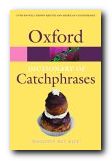explanations, history, and origin of proverbial sayings
A proverb is a traditional saying which offers advice or presents a moral in a short or pithy manner – as in You can’t have your cake and eat it. Now reissued and updated, this reference dictionary provides the reader with over 1,100 of the best-known English proverbs from around the world. For this fourth edition, the explanatory material has been expanded and new, recently coined proverbs added including Another day, another dollar, Bad things come in threes, and Better to live one day as a tiger than a thousand years as a sheep.
 The collection makes a useful point that proverbs fall into three main categories. First, abstract statements expressing general truths (Adversity makes strange bedfellows); second, everyday experiences which express a general truth (Don’t put all your eggs in one basket); and third, classical examples of advice and warning (Feed a cold and starve a fever).
The collection makes a useful point that proverbs fall into three main categories. First, abstract statements expressing general truths (Adversity makes strange bedfellows); second, everyday experiences which express a general truth (Don’t put all your eggs in one basket); and third, classical examples of advice and warning (Feed a cold and starve a fever).
This is the first time that the Internet has been tapped to provide examples, which range from Absence makes the heart grow fonder to If youth knew, if age could.
Many of these expressions are traditional, but proverbial coinings continue into the present day – as in the recent There’s no such thing as a free lunch. And many are surprisingly modern – such as A change is as good as a rest, which dates from the end of the nineteenth century.
There are also thematic entries which take a key word and record the proverbs which use it – as in the following example:
old see also BETTER be an old man’s darling, than a young man’s slave; you cannot CATCH old birds with chaff; there’s no FOOL like an old fool; there’s many a GOOD tune played on an old fiddle; HANG a thief when he’s young and he’ll no’ steal when he’s old; … and so on …
A typical entry records the proverb with key word highlighted, then a record of where the phrase has appeared since its first appearance in print:
the HAND that rocks the cradle rules the world
1865 W.R.WALLACE in J.K.Hoyt Cyclopedia of Practical Quotations (1896) 402 A mightier power and stronger Man from his throne has hurled, For the hand that rocks the cradle is the hand that rules the world. a 1916 ‘SAKI‘ Toys of Peace (1919) 158 You can’t prevent it; it’s the nature of the sex. The hand that rocks the cradle rocks the world, in a volcanic sense. 1996 Washington Times 10 May A2 The habits of the home in one generation become the morals of society in the next. As the old adage says: ‘The hand that rocks the cradle rules the world’. cf women
Chronologically, the dates of the examples span from Old English After a storm comes a calm (1250) to contemporary notions such as When the going gets tough, the tough get going.
Sometimes explanations of the origins of these expressions are offered; sometimes not. There’s a bibliography and a thematic index.
© Roy Johnson 2008
Jennifer Speake, The Oxford Dictionary of Proverbs, Oxford: Oxford University Press, 5th edition, 2008, pp.400, ISBN: 0199539537
More on dictionaries
More on language
More on grammar

